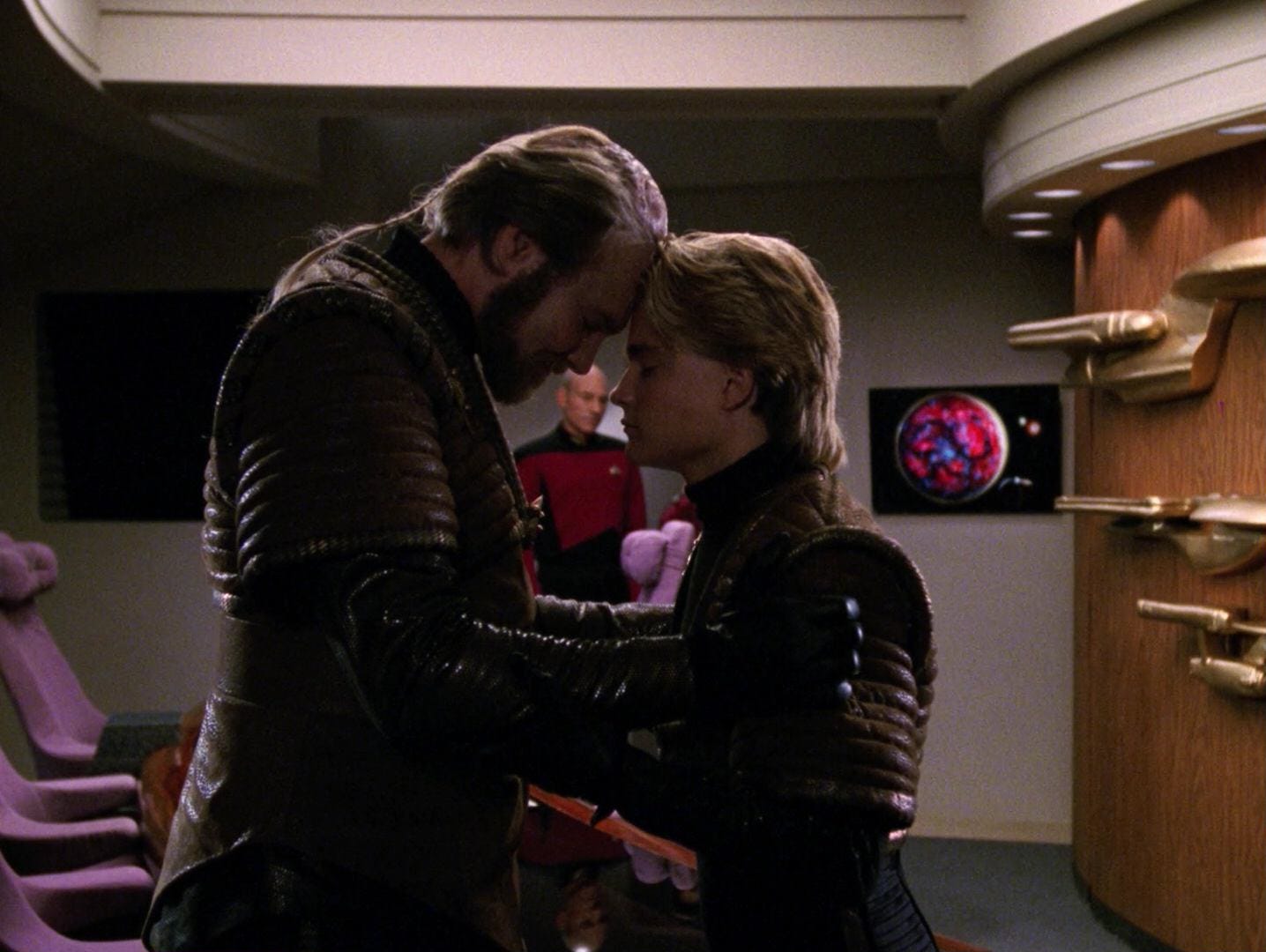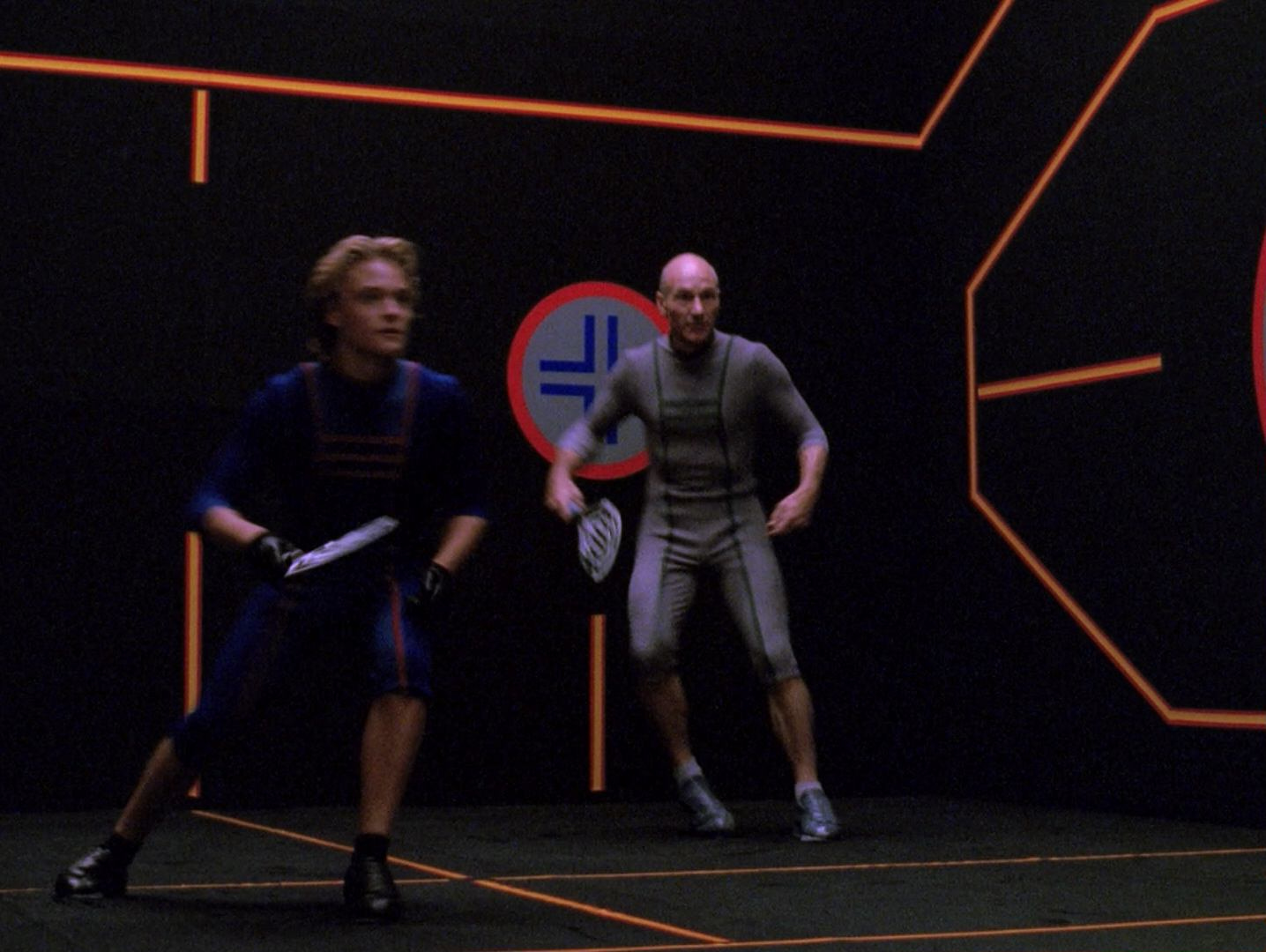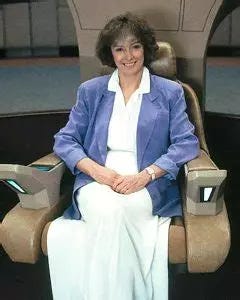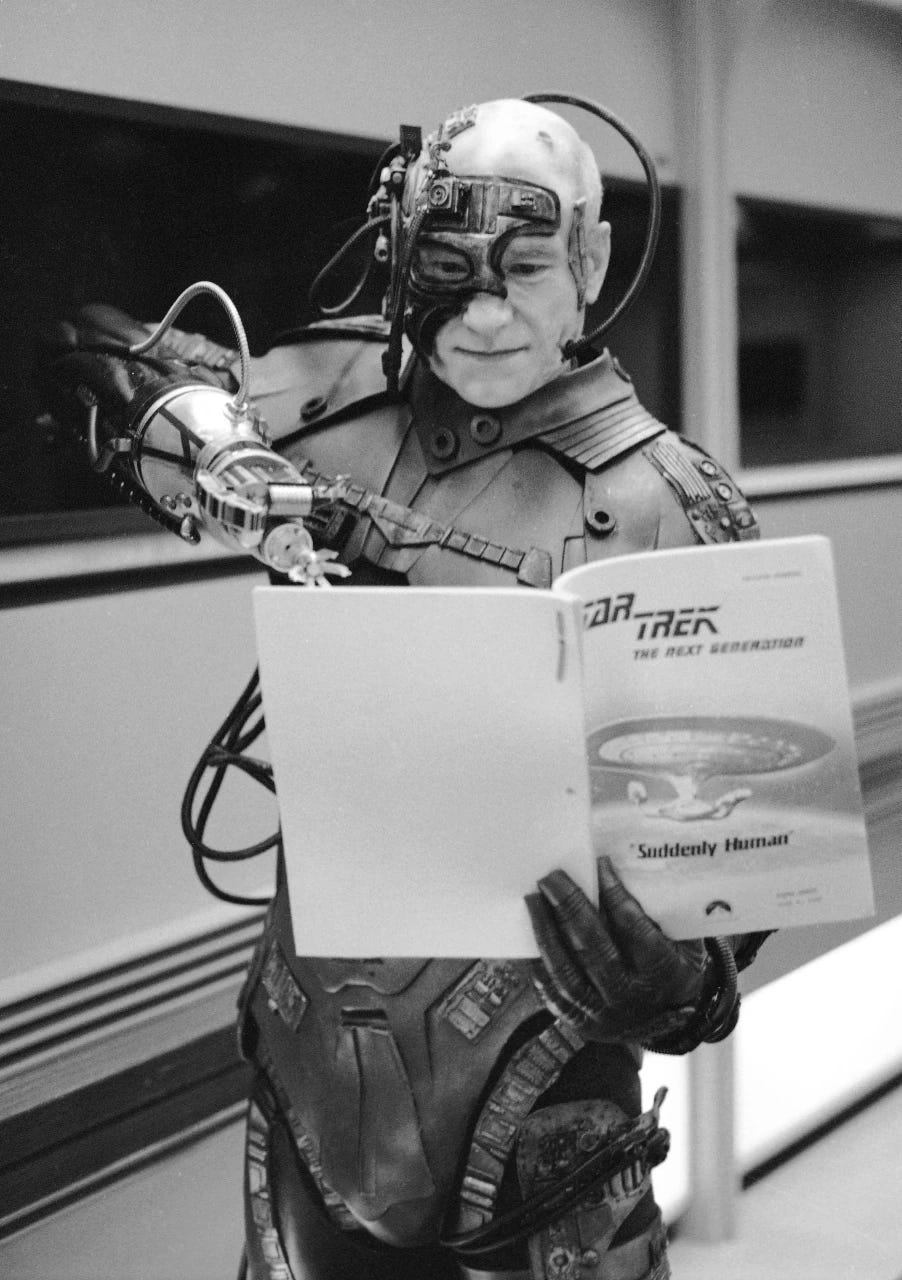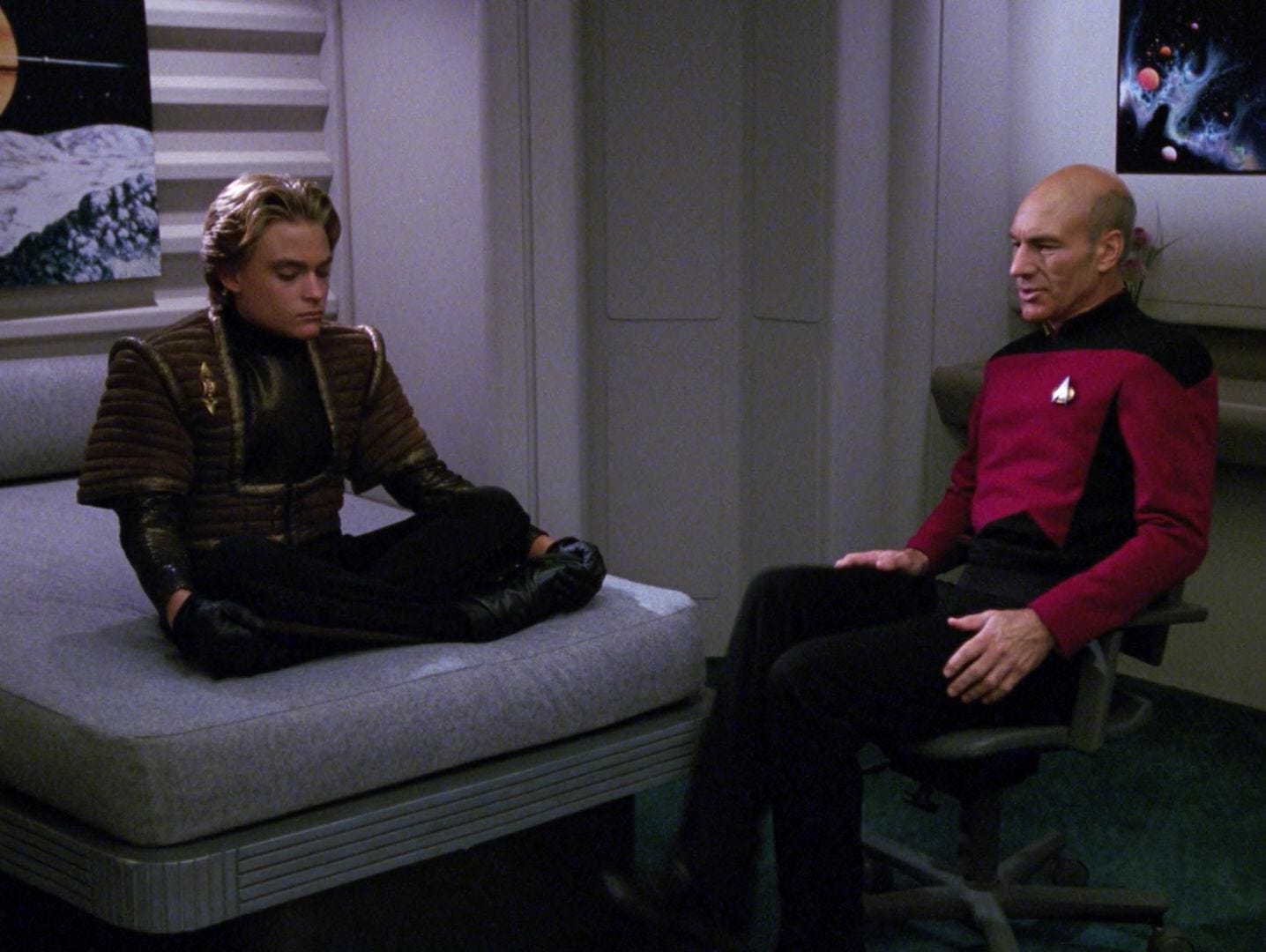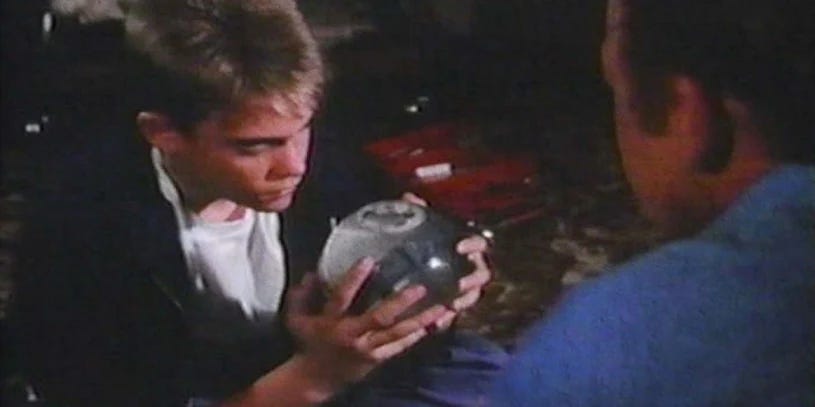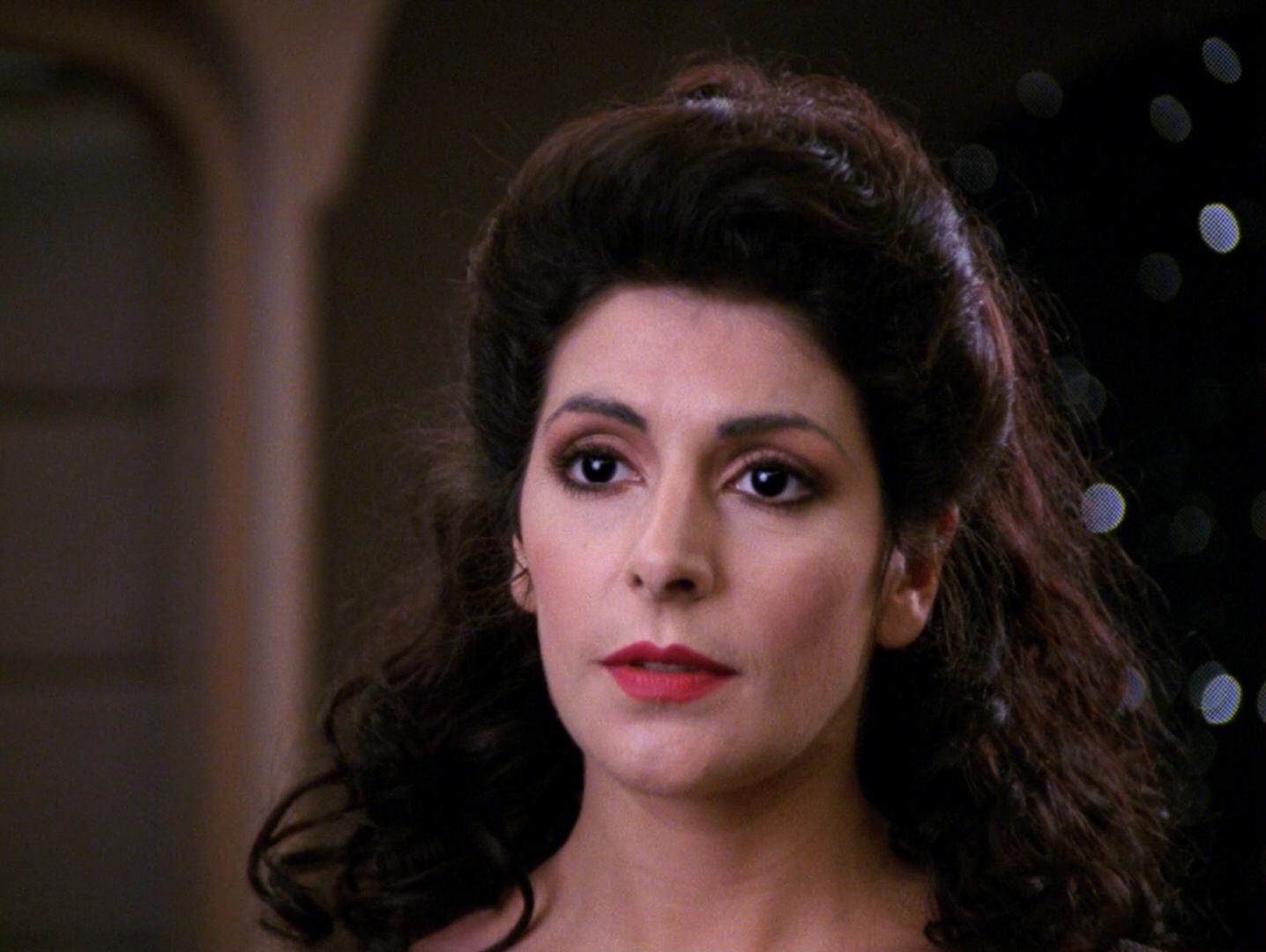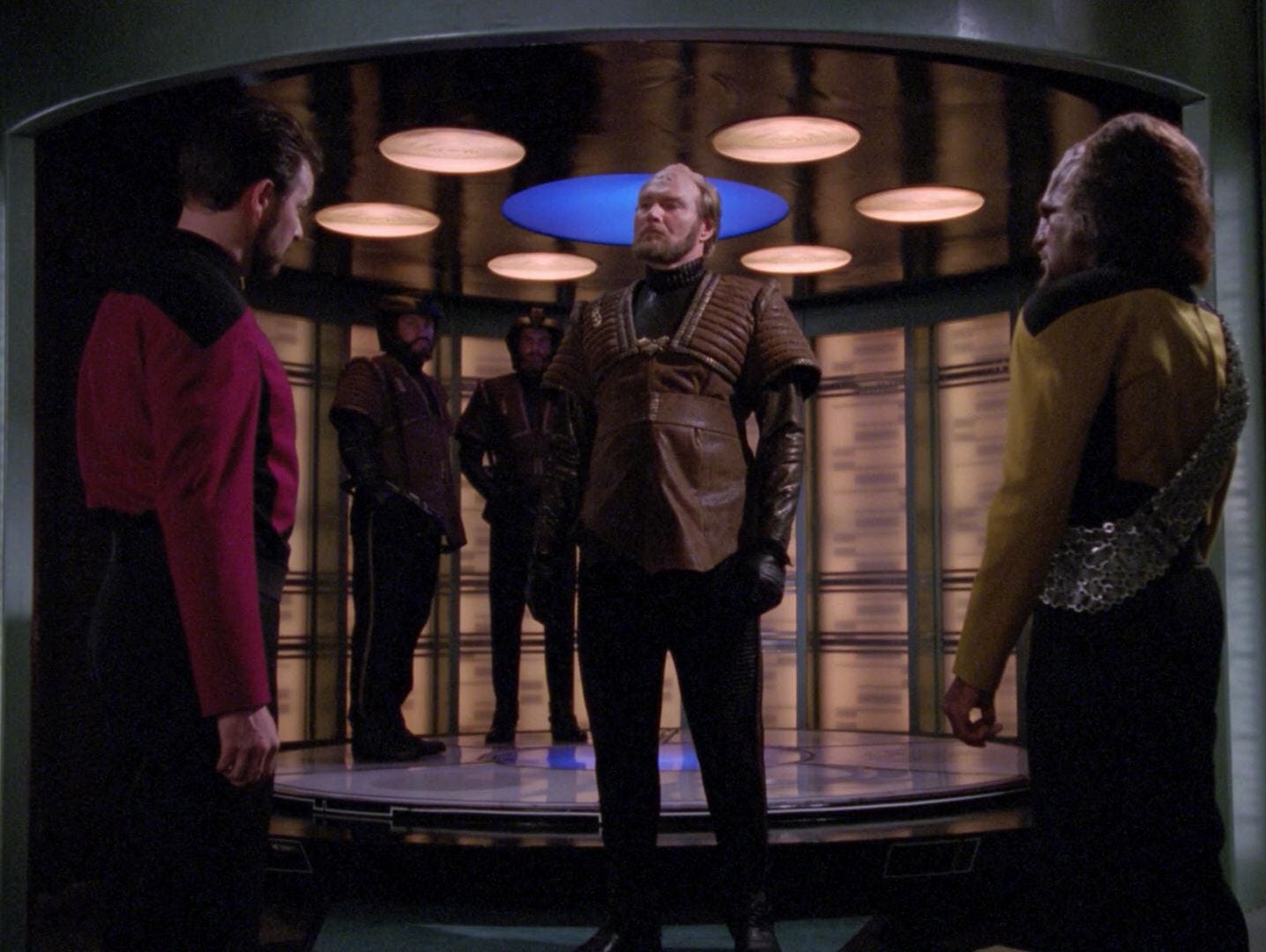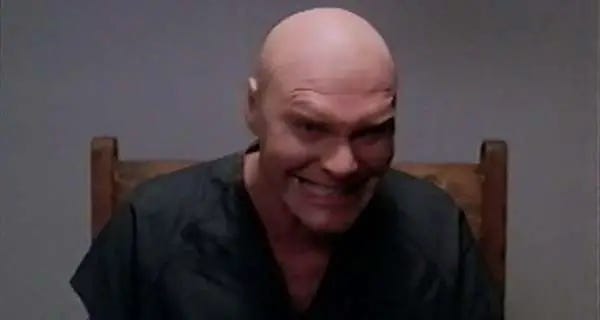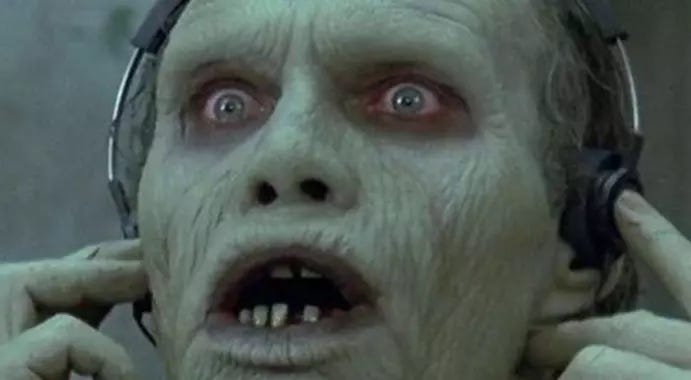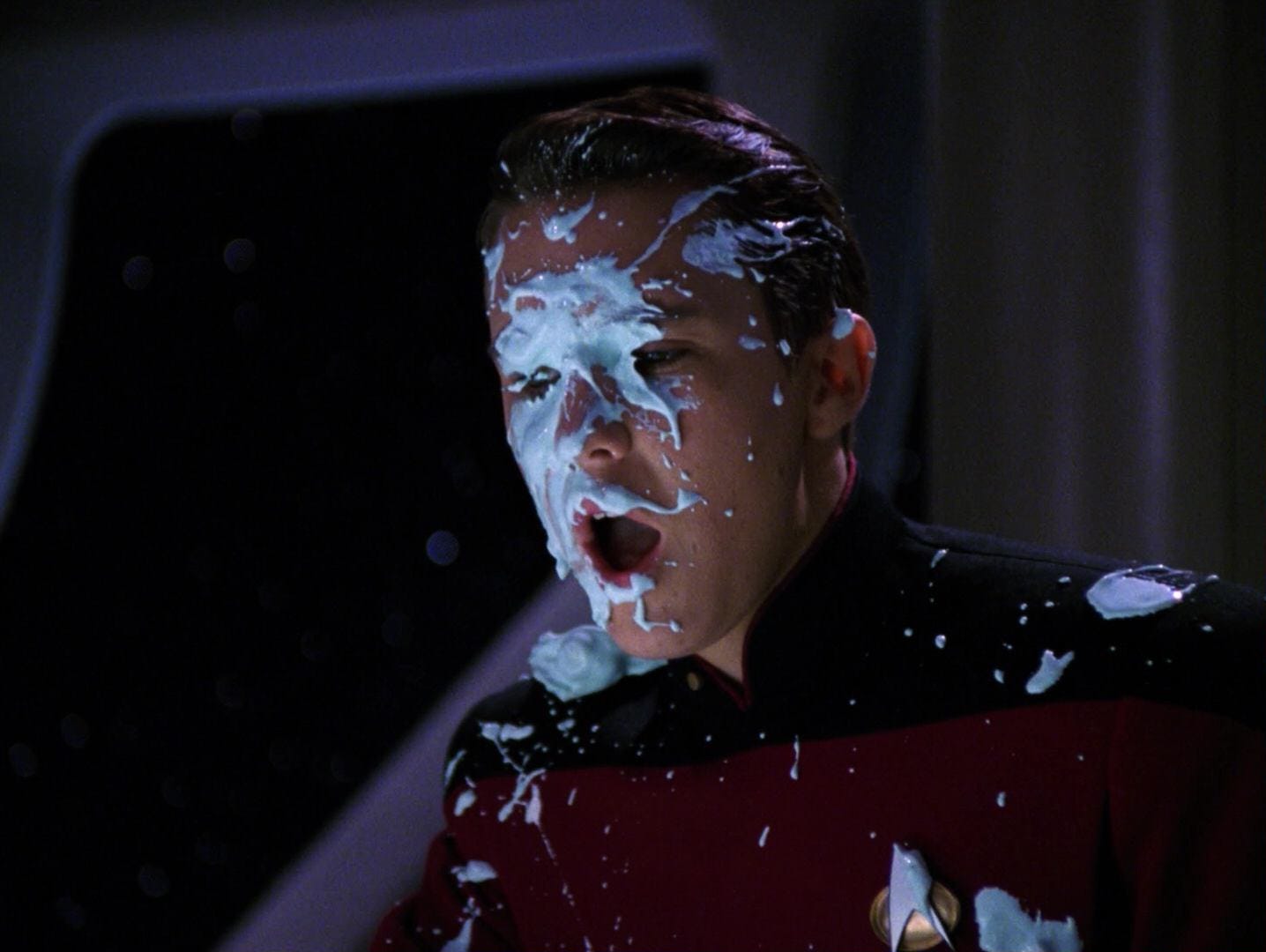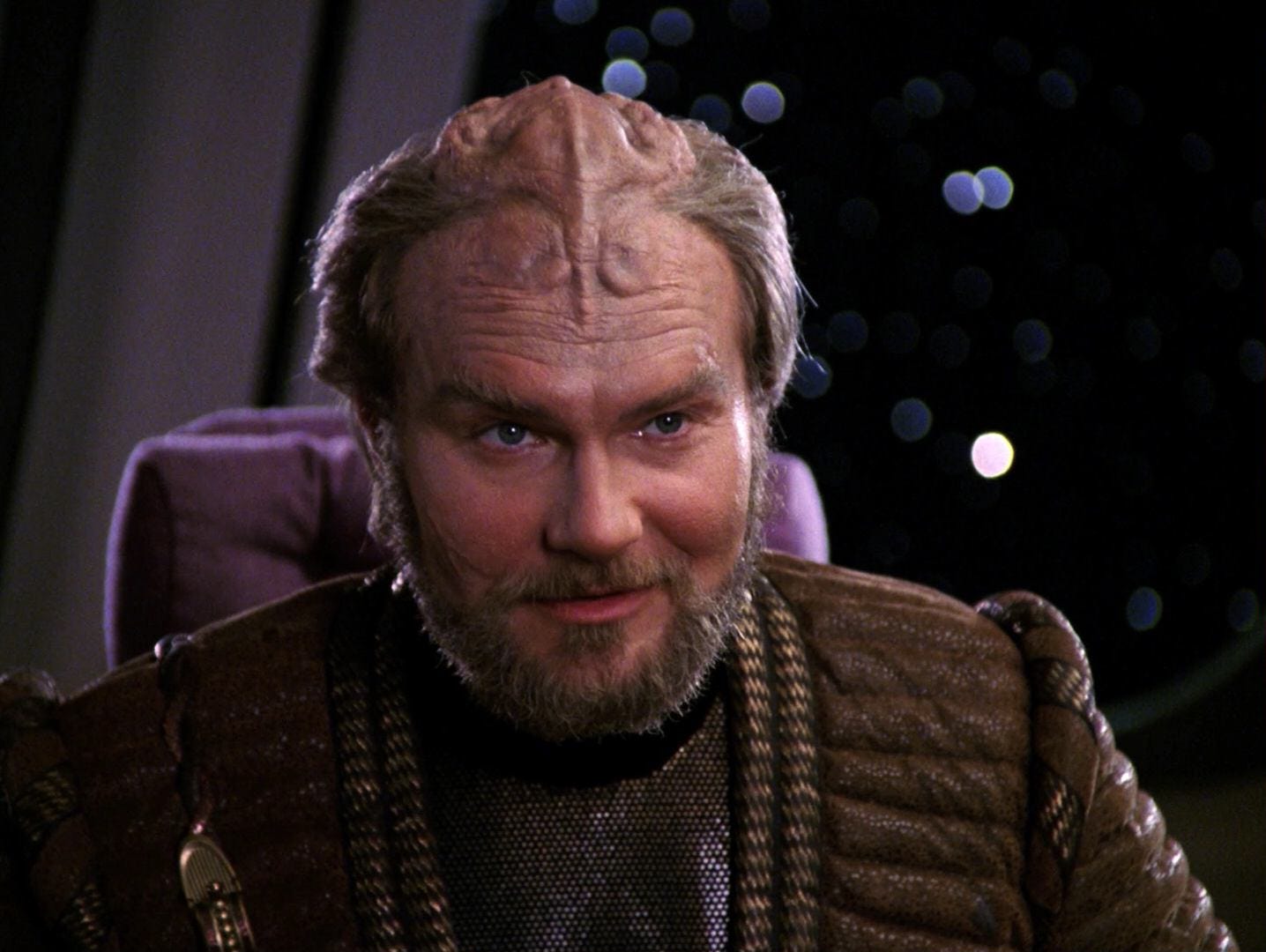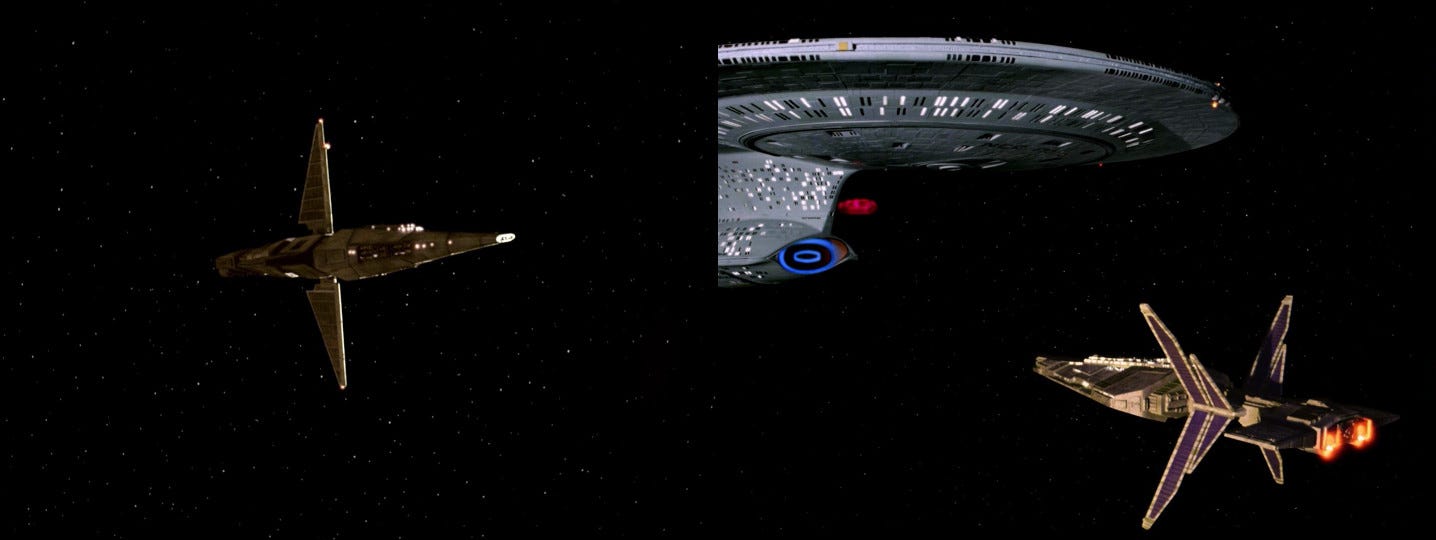Suddenly Human
Since it's family season, can we contrive an excuse to make Picard a daddy? Oh, go on then...
Data gives an exposition dump on the bridge so we all know that the Talarians are badasses who maybe can’t be trusted, then off go the away team to see who’s aboard the alien ship. It turns out to be half a dozen Talarians, who howl like wolves when taken aboard the Enterprise and manage to annoy everyone in sickbay even more than Wesley. Oh, and what’s this? One of them turns out to be human... or is he? I mean, yes he is, but the entire episode revolves around whether or not he belongs with the humans or the Talarians.
By an astonishing coincidence that has everyone saying ‘wow, what a small galaxy this is’, Jono is not only biologically human but related to a Starfleet Admiral. It all sets up a tug of war between the Federation and the Talarians during which there’s a lot of tongue wagging and hand-wringing until eventually Picard gets stabbed (again), which is more than he deserves after thinking that the right thing to do with a warrior child is to teach him how to play squash.
Words
It’s a bottle show, so the name of the game is saving money by reusing everything you can (mostly the Enterprise sets on Sound Stage 9, although the squash court was set up in Sound Stage 16). You need a good high concept to make these kinds of low-budget episodes work, and in this case we have something like an existential conundrum to chew over. It’s one of those stories where the question of whether someone is or isn’t human doesn’t hinge upon weirdo DNA or space alien reveals, but is rather a philosophical reflection about what makes someone part of a particular culture.
This was Jeri Taylor’s very first screenplay for Trek, and she would go on to write seventeen screenplays for TNG as well as three for DS9 and fourteen for Voyager, which (to cap off a sterling career in Trek) she co-created with Rick Berman and Michael Piller. In the case of this particular episode, she was just brought in as a script doctor to rescue a story that had got into dire straits. The production team were so happy with her work, they hired her as a supervising producer on the show almost immediately.
Taylor originally wanted to call the alien race ‘Phrygians’, presumably after the Bronze Age culture that lived in what is now called Turkey (or possibly after that wonderful composition ‘Adagio of Spartacus and Phrygia’, which is one of my favourite pieces of music…) However, Michael Okuda was always looking to keep the lore a little tighter and encouraged her to pick ‘Talarian’ because they'd been mentioned but not seen back in the first season episode “Heart of Glory”. The font and emblem seen in that earlier episode reappear here, and this commitment to reusing lore fragments and their associated props becomes more and more common now that Rick Berman is in charge.
The thematic thrust of the story is an interesting one, and in many respects much more so than the plot, which plods along quite unremarkably. But the question of ties of blood versus ties of kinship is an engaging one, and it’s brave of this episode to make the Talarians the kind of culture most folks in the audience would repudiate (patriarchal, misogynistic, violent, apparently untrustworthy) yet still end the show by leaving Jono with his adoptive father. This is perhaps what I most respect in this story, because it took a certain courage to take this line. Indeed, the show got a lot of letters of complaint about it allegedly condoning child abuse. As Rick Berman recalled about it:
We wanted to make the point that the interpretation of broken bones was nothing more than normal childhood broken bones, and that these people were sort of prejudiced in this direction. It was in no way intended to be an episode that had anything to do with child abuse. It was the ‘wild child’. It had to do with a boy being brought from one culture to another and not fitting in with either, and the inevitable need for him to return back to the world in which he grew up.
I’ve seen this kind of story in legal dramas many times, but in sci-fi, they’re really quite rare.
Acting Roles
Although there’s a little room for the other cast members to contribute here and there, the episode basically revolves around the double act of Patrick Stewart’s Picard and Chad Allen’s Jono.
They do work well together, and Allen is a cut above many of the child stars this show gets in. Allen had already had two dozen roles before this, including a recurring role in St. Elsewhere as Tommy Westphall, the autistic son of one of the main characters (and who, according to the fan lore, is responsible for dreaming the entirety of St. Elsewhere, Cheers and several other TV shows set in Boston - perhaps even The X-Files! I'm not kidding, look this one up, it’s one of the most astonishing fanonical theories around!
Later in his career, he picked up the key role of Matthew Cooper in Dr. Quinn, Medicine Woman, although he has now retired from acting and taken up a career as a clinical psychologist. I guess Troi inspired him.
Speaking of Marina Sirtis’ Troi - she is actually useful in this episode! I can’t help but think Jeri Taylor took pity upon Sirtis and made an effort to use both her empathic powers (“There is life on board... but it’s fading”) and also her job role in terms of advising Picard and making sure he doesn’t weasel out of his newfound responsibilities.
Sherman Howard’s Captain Endar is the other major guest star this week, and his performance is important both for anchoring the drama and setting up the climax - we have to believe he’s willing to go to war, and thanks to a solid delivery we do.
Howard got his break as Gordon Grey on General Hospital, a role that was later taken over by another actor. He had a small recurring role in the short-lived sci-fi show Max Headroom (not to be confused with the chat show featuring the same character), played Japhet Harper on Dallas for half a dozen episodes, and (plentiful voice work aside) had his longest recurring role as the second version of Lex Luthor in the 80s and 90s show Superboy, which he was working on at the time this episode was filmed.
Among Howard’s many bit part appearances, he pops up in quite a few sci-fi shows - Dark Angel, Quantum Leap, Space Rangers, SeaQuest DSV, Sliders… not to mention appearing in both DS9 and Voyager. But all of this pales in significance next to his greatest movie role: the ‘friendly’ zombie Bub in George A. Romero’s 1987 classic Day of the Dead.
Oh, and before we finish talking about the guest stars, let’s not forget that Jono manages to strike Wesley Crusher in the face with a banana split.
I feel he should have stabbed Wesley and hit Picard with the ice cream dessert, but never mind.
Models, Make-up, and Mattes
The Talarian make-up is well constructed and convincing, but because it focusses on a cranial ridge it does make them look like distant relatives of the Klingons. It’s a small complaint, however.
And bottle show or not, they sprang for two new spaceship studio miniatures, which were designed by Rick Sternbach and built from scratch for this episode.
They’re lovely, and both will see a lot of service elsewhere in TNG and beyond, although we’ll only see the sailboat-inspired Observation Craft (left) only once more in TNG. However, the Warship (right) has five more TNG appearances, and both crop up in DS9 and Voyager many times as well. That’s how it is you get a new model in a show that is otherwise trying to conserve budget: you promise the producers that you’ll definitely find a way to use them again!



